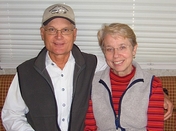Because We Can - Fulltime RV'ing
- Ruthsarian :
- Home :
- Today's Journal :
- Where We Are #2917 :
- Who We Are :
- Contact Us :
Journal Archive 6/21 - 6/30 2009
Scroll down to read the latest post
June 21 Sunday
Heading to Prague, It's all Czech to us, tour time, getting to know you, year's longest day.
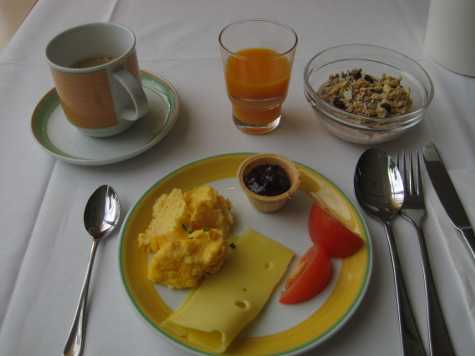
Linda discovered something new this morning. It was the tiny ice cream cone filled with jelly. Maybe she's at the stage of life where she's already experienced most things, or maybe she's just easily excited, but whatever it was, she was a happy girl.
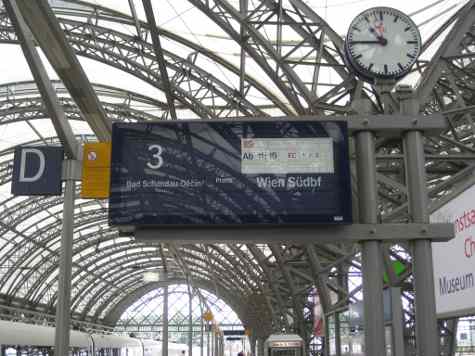
We weren't in any hurry this morning since the train didn't leave until 11:10, so I got a chance to get caught up on the Daily Journals. Knowing that we would have to buy Metro tickets when we got to Prague, we exchanged 50 Euro into Czech Crowns. This was the first time we have done this, but knowing we needed some smaller denominations, we thought we'd try it. The exchange was very easy, not at all expensive, and besides, it made Linda a whole lot more comfortable.
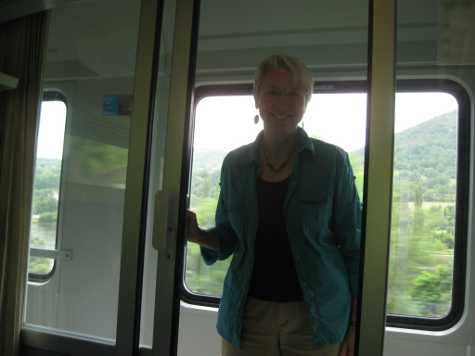
We had opted to not get a seat reservation, which worked out fine, as the first car we entered had several empty compartments. During the entire trip no one ever joined us in our compartment, however, Linda didn't repeat her nap she took on the Polish train, so all the extra space was wasted.
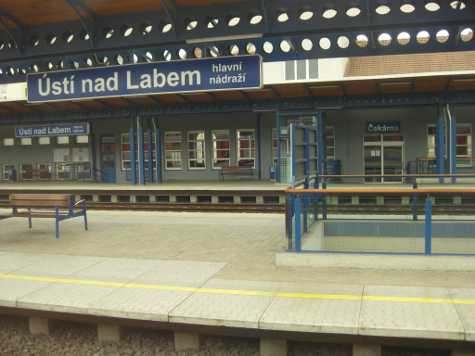
There was nothing definite that said Germany ends and Czech Republic begins. There was of course a large rail center full of Czech rail cars, and also some minor differences in the shape of the houses. There was as obvious change in the signs at the railway stations, otherwise, out the window it was a Sunday afternoon and we could see families doing things together.
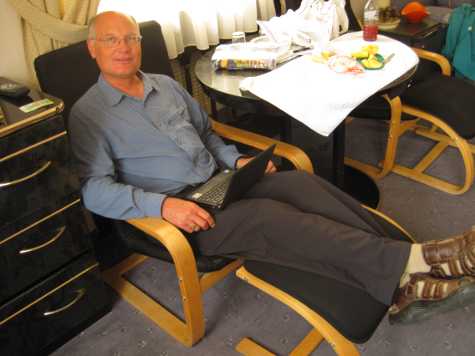
We did have the usual problem with the signs being in a language we couldn't comprehend, the ATM machine and the Metro, but by now we are used to those things. The ATM issued us one high denomination bill, making us glad we had exchanged some Euro for Crowns in Dresden. There were no signs that were understandable indicating where to get the Metro.
Then we were at a different train station than we had planned for, so our directions to the hotel were wrong. Fortunately Linda had caught this on the way here, so she had that solved, if we could read the signs that is. The guide book always gives the English translations,while the signs are in Czech. A change of Metro trains, and we emerged exactly where we supposed to be, a short walk and we were happily at the hotel as you can see.
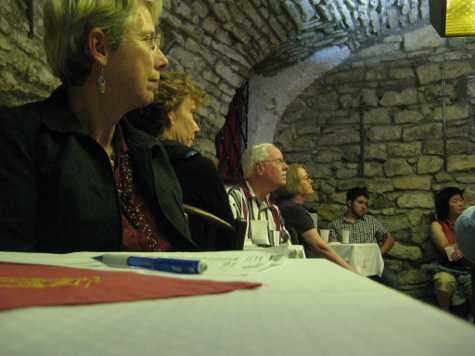
We got the website updated, talked to several other members of the tour, and then, at five o'clock went down into the cellar for the get acquainted meeting. From the degree of attention everyone seems to paying, it looks like they are really into the tour. That was certainly the case, the strong, yet lyrical Czech accent of our guide, Honza, may also had something to do with it. But with the obvious love of his native country just pouring out, it really had more to do with everyone wanting to soak up every word, he was that enthusiastic. And, no, he's not in the photo.
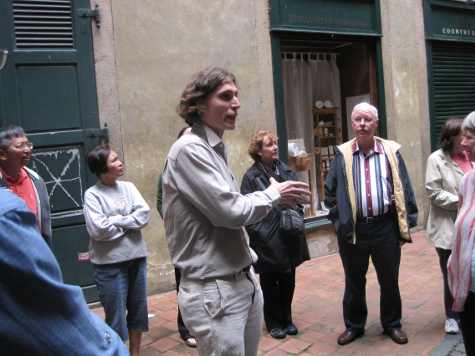
As on every tour, following the initial meeting, we took a brief tour of the area around the hotel. Because Honza is tall it was easy to pick him out, but with those long legs he also sets a very torrid pace.
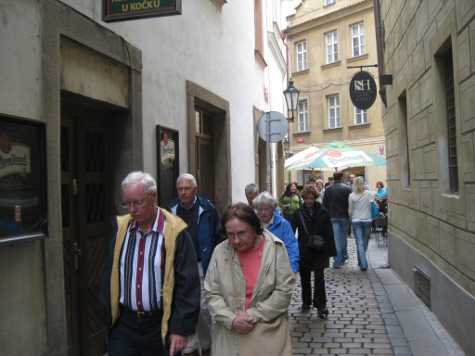
It also included lots of narrow alley's, which were actually streets in the medieval times when the buildings where originally laid out and built.
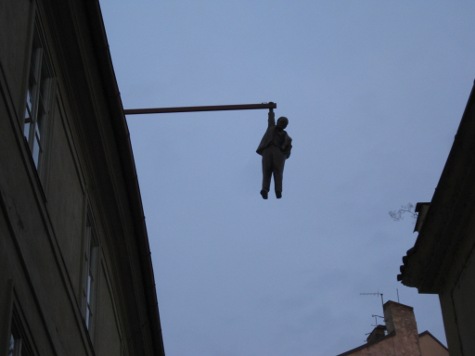
One of the jokes in Czech is that Lenin is still hanging on. With 16 percent of the vote in the elections, there are still some communists remaining in the country.. To show how communism, I.e., Lenin, is hanging on, someone put up this figure of Lenin hanging on to a pole high above the street, bring to life the joke, Lenin's still hanging on.
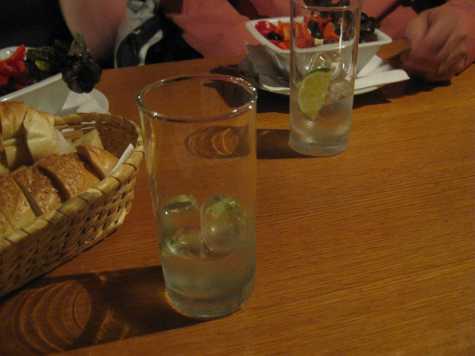
The meal that followed the walk had one surprise, ice cubes. We tried to think of the last time we had ice cubes and failed. They are something that you just don't see in Europe. Having never patronized a McDonalds or a Burger king, we don't know if they have them, but it's also something we're not going to try and find out. By the way, the meal was awesome, will our run of great meals never end?
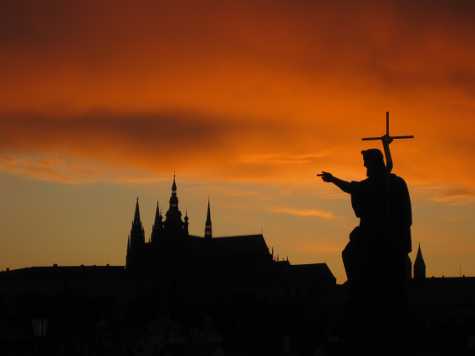
Two sunset photos in a row, but when it is this good, why not. The longest day of the year, standing on the Charles Bridge over the Vltava River, one of the many statues lining the bridge in the foreground, the Prague Castle, high on the hill behind it, and in the distance the golden glow of the setting sun. It looks like it is going to be a great 17 days in Eastern Europe. And Happy Father's Day to all those Dad's out there.
June 22 Monday
Touring Prague, Museum of Communism, Swedish supper
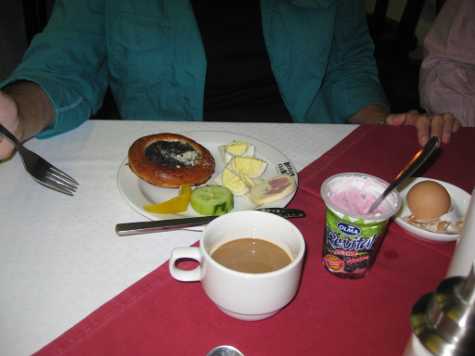
Our first Czech breakfast, and we were anxious to find out what would be available. When I opened the heating tray cover and found a tray of eggs staring back at me, I had a few doubts, all of which were quickly dispelled. Linda noted it was the first time since Switzerland that there no tomatoes available, To salve her hurt at being deprived her favorite food, she took a filled sweet pastry. It served her right when the filling turned out to be not nearly as good as she imagined. I took two other kinds of pastry that drew glares from her, but ovations from my taste buds.
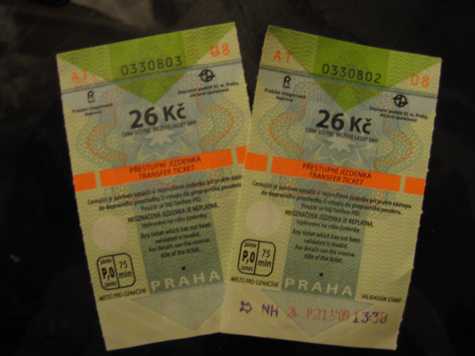
A brief word about the money in Czech Republic. The basic unit is the Czech Crown, and the above Metro ticket, good for 75 minutes, cost 26 crowns.
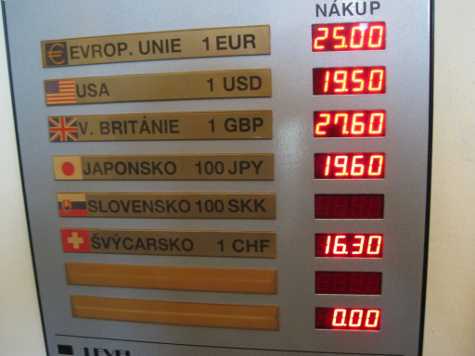
The way to know how far your money goes is to relate those Crowns back to the dollar. Here are the exchange rates for today at one of the money exchanges. With one dollar equalling almost 20 Crowns, something which costs 1000 Crowns, is approximately 50 dollars. The big numbers take some getting used to, but when after a 200 crown purchase,you realize it only cost 10 dollars, it isn't so bad. It also shows what inflation can do to the value of a currency, and why governments try so hard to keep inflation low.
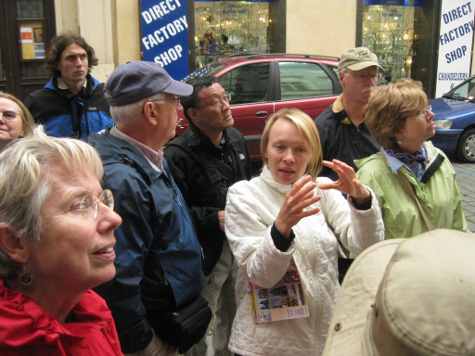
At 9 o'clock we met our guide for the morning's tour of Prague. Sarka, which is Sara in English. She was blond bundle of energy, who did a fantastic job of not only showing us around the Old Town, the New Town, and the Jewish Quarter, but did it in a most entertaining way.
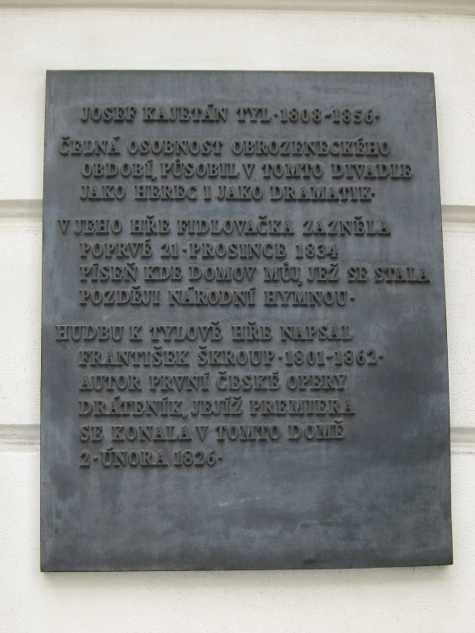
She also explained what the bronze plaques were we kept seeing on buildings. They are to provide tourists with some historical information about the building or location where they were placed. The problem was they are in Czech and the majority of visitors to Prague do not read Czech. As she said, that is the way it is with Czech government.
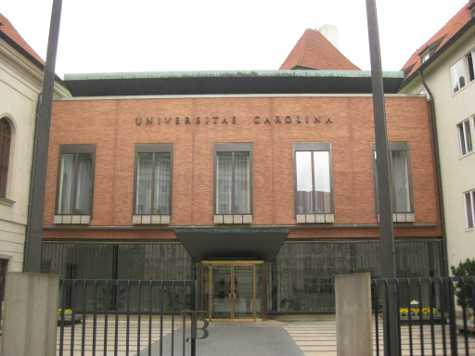
Main entrance to the University founded by King Charles in the 1300's. The story is in the modern looking entrance. While the interior of the building and the other buildings nearby that houses the university date from the 1300's, the communists didn't want the entrance to look that old, so they rebuilt it and made sure anything that related to the university was filmed in front of the this modern entrance.
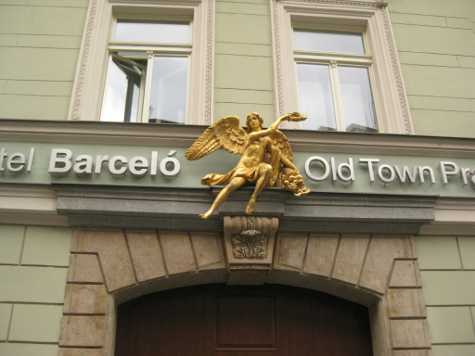
In the early days of Prague, buildings and houses were known by the statue that was mounted on them. Today, even though all buildings have street addresses, many still sport their ancient statues. This building for example was known as the House of the Golden Angel.
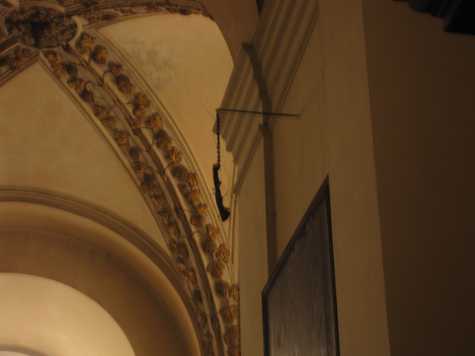
Another thing which was different in Medieval Prague was punishment for criminal acts. In one of the churches hangs the arm of a thief. Back then cruel and unusual punishment had a different meaning.
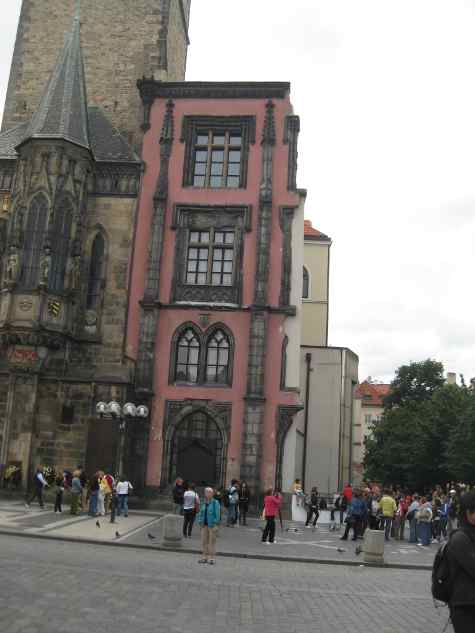
Not everything is as it appears. This is the Prague city building. Note the ancient towers next to the main part of the building which is pink. Part, is the operative word. When the Nazis were leaving Prague during WW II, they tried to destroy this building. Part of it was saved, and instead of rebuilding the destroyed part, the Czech left it as a memorial to what happened to them during the war.
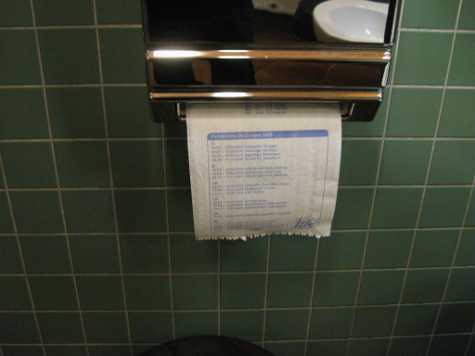
During our lunch stop we both came across something new, at least to us. In the restrooms the paper towels had advertising printed on them. Lunch was great, with traditional Czech food offering more than expected. It is so rich and hardy that we we left feeling like overstuffed bears about to go into hibernation.
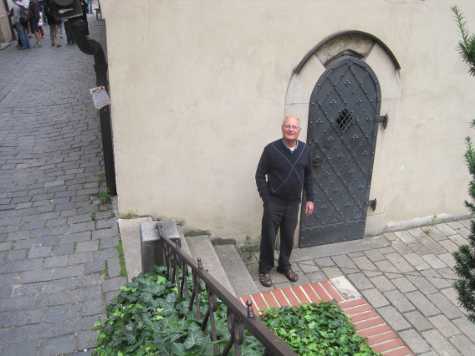
Standing by a building which is over 800 years old shows one of the many changes in Prague over the centuries. Linda is taking the photo from the current street level which shows the height they were raised, mostly to prevent flooding.
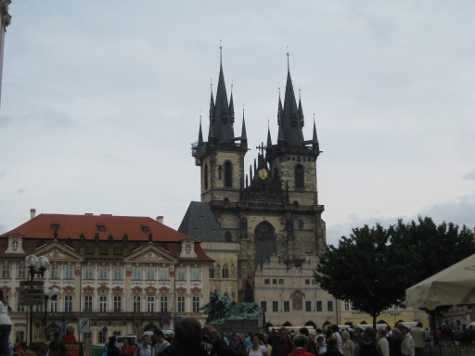
Interesting buildings abound in Prague. The most important church in town was on the square, but behind a row of buildings that had been built before the church was built. Why the Kings didn't have those buildings torn down is one the things that makes Prague so interesting. We never did learn why they weren't torn down.
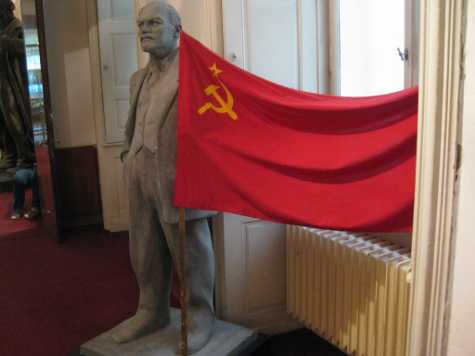
In the late afternoon Linda got to pick where we would go next, and it turned out to be the Museum of Communism. It was a great little museum, done in such a way that you really understood the place of communism within the background of Czech history and culture.
The Czech people actually voted in communism in a free election, but as soon as the communists were in power,and didn't do any of the things they promised, they realized they would be voted out of power,so they changed the laws to make sure they would stay in power.
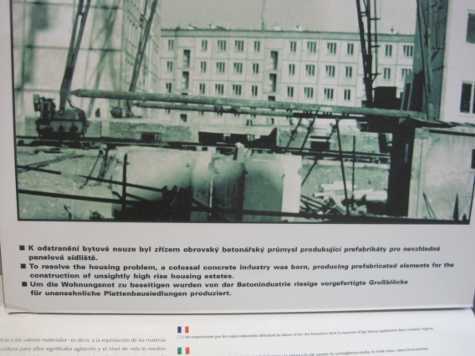
The way the system worked was to give everything that dealt with life a socialist perspective. Such as telling them the people of Czechoslovakia had true freedom and the people in the west didn't. That here the worker and the factory manager were equal. That their were no rich capitalists that made their money off the backs of the working people. This also included the massive apartment buildings where everyone lived.l
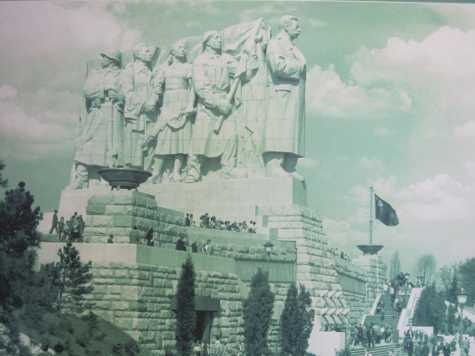
Photo of the gigantic statue of Stalin erected in Prague. It almost bankrupted the city financing its construction, then it was only a few years before Stalin's crimes were revealed and the statue was destroyed. There were many worthwhile exhibits and the movie, with English subtitles is very thought provoking. By the time we left, we had been challenged to the the point of emotional exhaustion, and understood better the struggles of the Czech people. No one system of governance is all bad, but the people implementing communism tried to make theirs so. Balance, it's all about balance, whether it is our system their system or another yet untested system.
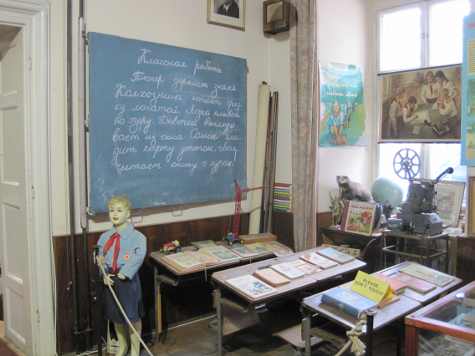
Indoctrination started at an early age. Some parents used the evenings and weekends to counteract these teachings. As Honza told us, it didn't take long to understand that whatever the Headmaster or the assistant headmaster said, the opposite was most likely true. Especially when they were both members of the communist party, and particularly the assistant headmaster as he was head of the local party.at the school.
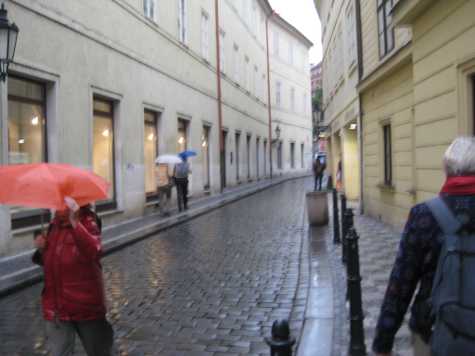
That evening when we went out to find a restaurant for dinner we encountered a problem. First it was raining,and second we had a serious time finding a place to eat. Either the places were closed, or about to close, it was Monday, the day so many restaurants are closed, or they were not only packed, the smell of cigarette smoke filled the air.
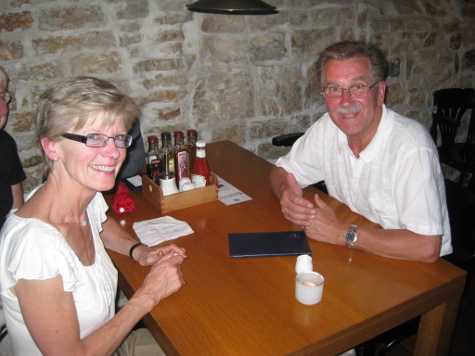
Then we stumbled upon one of those special moments that always seem to occur just when they are needed. We decided to eat at the same place we had the group meal last night. It was near the hotel and open, it hadn't been smokey, and because it was now later, we doubted if there was any wait.
We were right, but then something totally unexpected happened. The only tables available were shared tables, meaning we might dine with another couple at a table for four. We were given an empty table and in a few minutes another couple was seated with us. What transpired from that point was one of the most delightful meals we have had in a long time.
Tor and Maud Johannson from Sweden, in Prague because Maud is a true lover of opera. Maud was a teacher, and what she taught was English. While the food was good, the conversation was great, and we really enjoyed their company, learning so much about Sweden. While Sweden had been on our list of places to visit, now we are more excited than ever.
It's times like these that make travel so rewarding, the chance meeting, and the wonderful experiences that come from them. It's what make Life, Life. Thanks to Tor and Maud, an evening that wasn't going well for us, turned out to be a great evening. Who could ask for more.
June 23 Tuesday
Castle on the hill, the track of the velvet revolution, a night at the opera
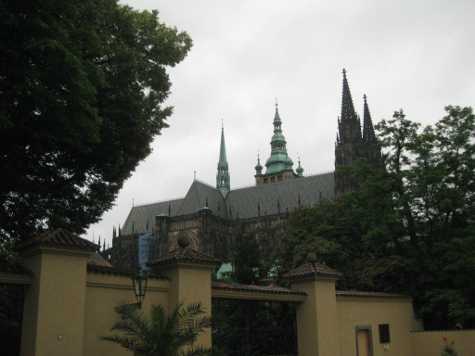
Our day began with Sarka once again leading us through the streets of Prague, then, after a tram ride, giving us a tour of Prague castle.
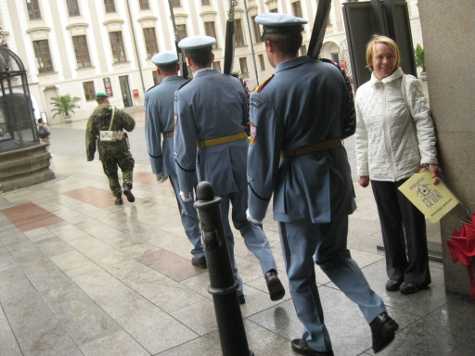
During the almost day long tour, we not only got to see the castle's guards, we got to see a number of changing of the guard ceremonies. Originally used by Kings, today the President of the Czech Republic lives and has his offices in the castle.
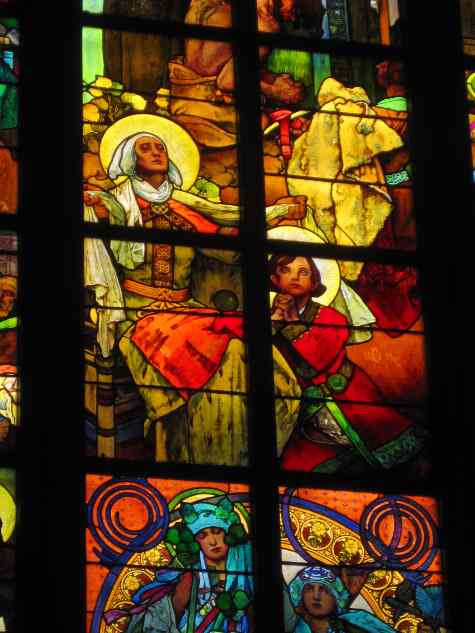
The first stop was at St Vitus Cathedral, where the kings worshiped. This was the St Vitus of the St Vitus dance. It was also a place that took a long time to build. Begun in the 13th century, it wasn't completed until the 20th century as some of the modern stained glass windows attest.
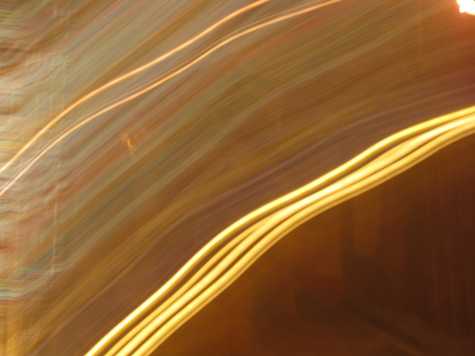
While all these catholic churches are imposing, architectural interesting,and filled with art objects, after a while they all seem to blur and run together. They are also filled with tourists, making for a follow the herd through the stockyard kind of experience.
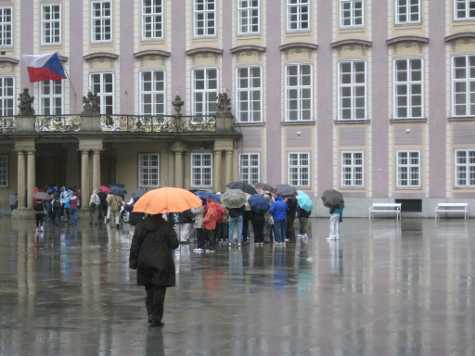
It wasn't the nicest day, with almost constant rain,but It wasn't because of this the buildings were so crowded. As we learned, the rain kept many visitors away. If you like crowds, it is the place for you, we both could have skipped it and been just as happy.
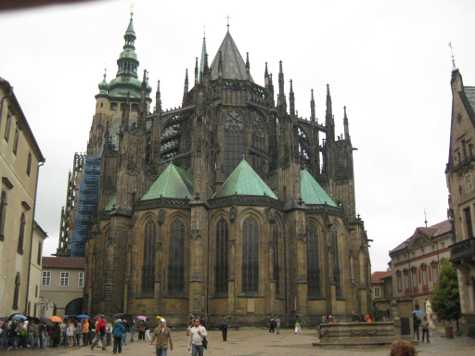
Outside, a view of the rear of the church showed the Gothic architecture, including the flying buttresses.
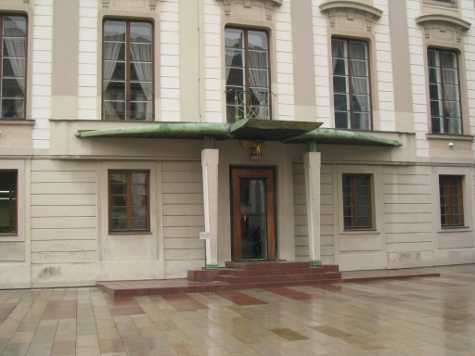
Entrance to the office of the Czech President. Quite the contrast from the area around the White House. After living under communism, they understand what it means to be free. They have their own form of government, which is more on the European model.
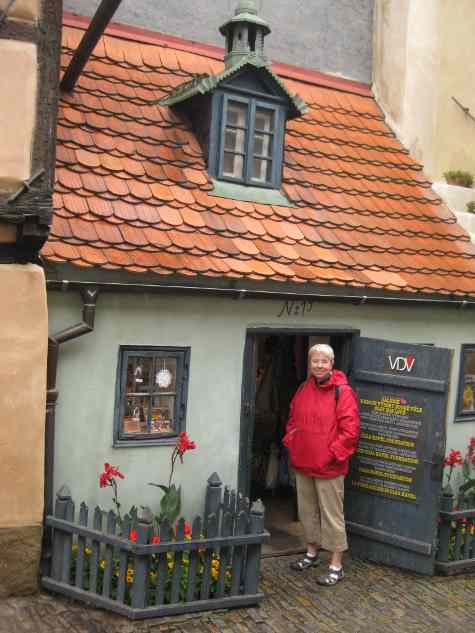
Not everything is as it appears, but sometimes it is. This is Golden Lane, and while not paved with gold, the buildings where indeed the size they appear to be.
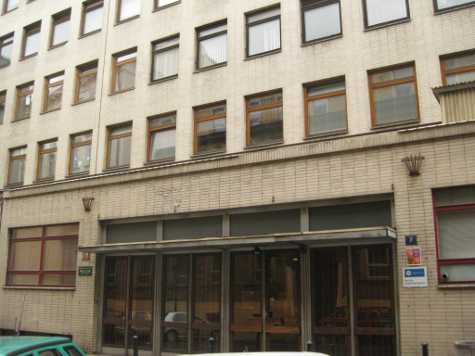
In the early evening, Honza took us along the path of the first demonstration of the velvet revolution, the series of marches and rallies that resulted in the overthrow of the communist regime. During the communist years this was the most feared address in the country. No one wanted to learn they needed to go the the building simply known as No. 7, the headquarters of the State Secret Police.
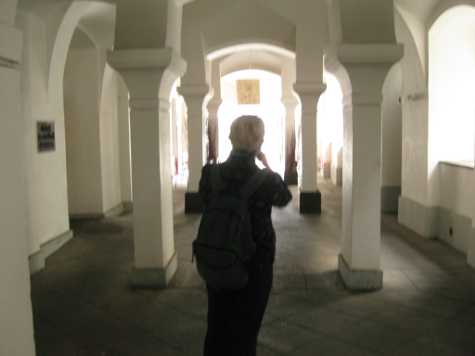
On the night of November 17, 1989 thousands of young protesters were forced to run down this corridor while the secret police, using heavy wooden sticks beat them unmercifully. Afterwards it was red with the blood of those young people. Yet instead of stopping the demonstrations, they intensified. We were also hearing about the events from an eyewitness.As a 15 year old boy, Honza along with his older sister had been their that night, escaping running the gauntlet by only minutes.
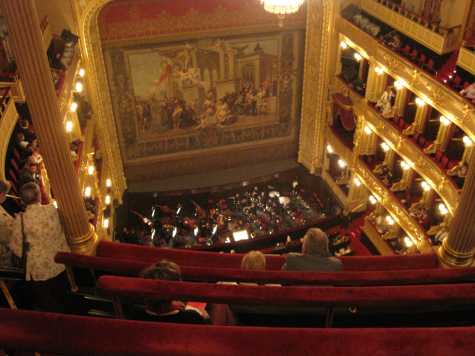
To complete the day, we went to the opera, which was a first for us. Our seats were not in the last row, they were in the next to last row, at the very top of the theater. Other than being hot, it was a wonderful experience.
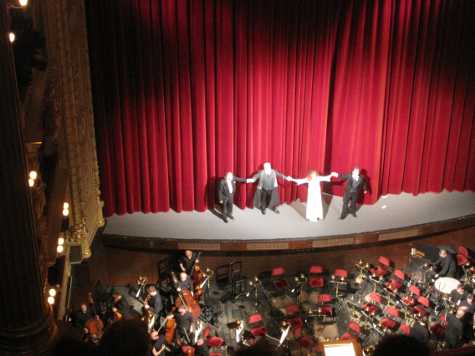
The opera was La Traviota, or something like that, we understood it was a very famous opera, and the lady in the lead was a renowned opera star. Not being into music, we still loved it. We also got caught up into the story and had to stay to the very last, including the curtain calls.
Things never experienced, what a day. From rain to a night at the opera. Who would have ever thought. The opera wasn't included in the tour, it was something we and a few other tours members did as an additional activity, and we were glad we did.
June 24 Wednesday
Leaving Prague, mountaintop hotel, an uphill walk and an evening of folk songs and dance.
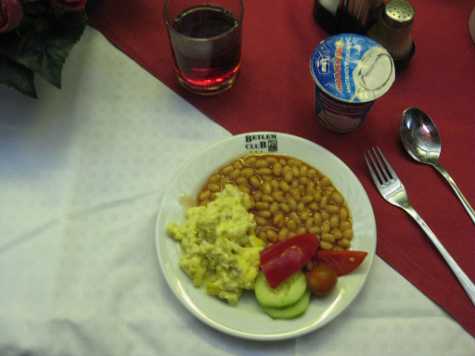
You could say that our breakfasts in Prague were different. We didn't have to eat the beans, but since that was what they served, that's what I ate. Linda passed, though you could say I passed later.
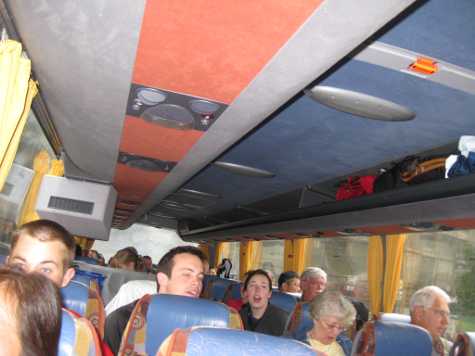
It was also our first time on the bus, and as you can tell, everyone was excited about it.
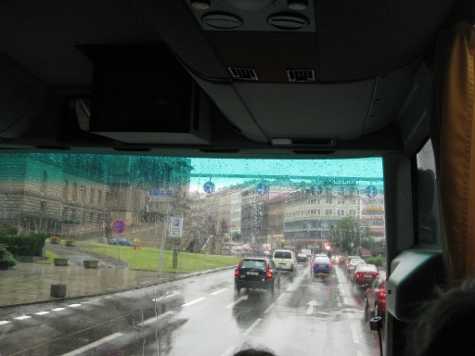
The legacy of the days of communist rule show themselves in many ways, some of them unusual. The main highway into town runs directly across the top of Wenceslas square. It was the communists who constructed this road so they could quickly move troops and tanks into this historic gathering place to crush any uprising by the Czech people.
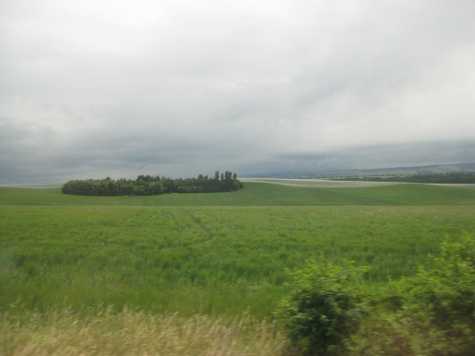
The Czech countryside is no different that what we have seen in other countries throughout our travels. The road is lined with the farmer's fields.
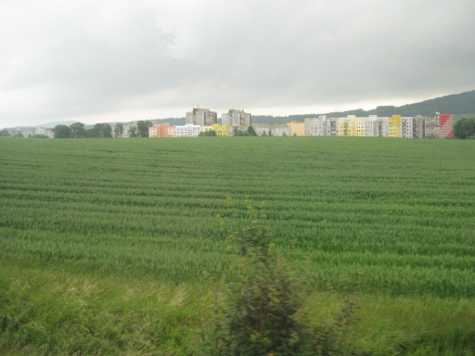
Another legacy of communism. Each town had to have a factory, for the communists were the party of the workers. To house those workers they constructed ugly gray cookie cutter apartments. The apartment buildings remain, but at least they have been dressed up with some bright colors.
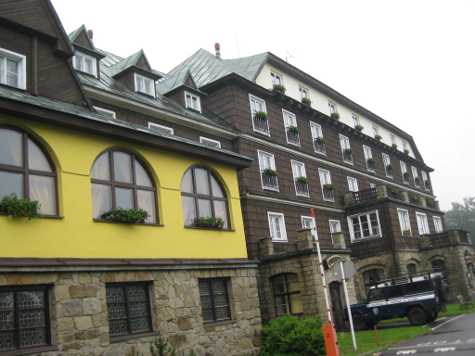
A long day on the bus, lunch at a small town, then arrival at our hotel for the night. Its street address, Top of the Mountain, said it all.
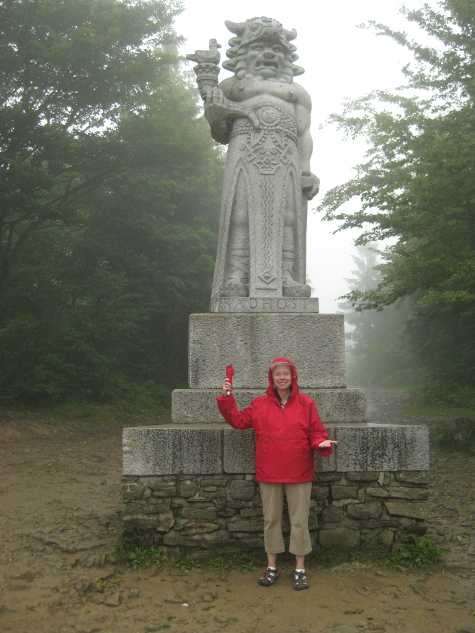
Despite the rain and the clouds, we took a walk to the statue of the mountain god. It was another good lesson for Linda, the lady who doesn't like to climb. Mountain gods are not found in the valley, they are found in the mountains. It surprised me she was willing to walk to the statue, but I think it was a case of, if we've come this far, we might as well go all the way.
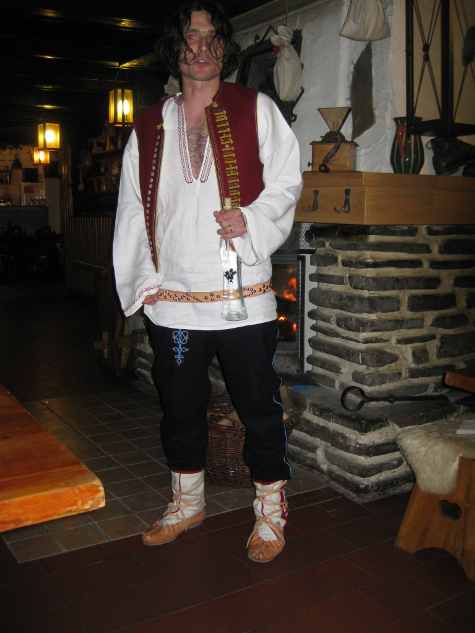
During dinner we had a visit from a somewhat bedraggled Honza dressed as a shepherd who had just come in out of the rainstorm.
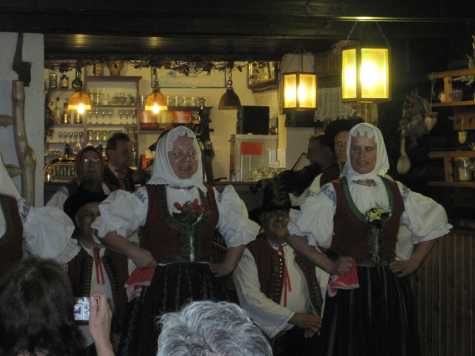
There was also music and dancing by a local group. The dances told various folk stories, and were a great treat to watch.
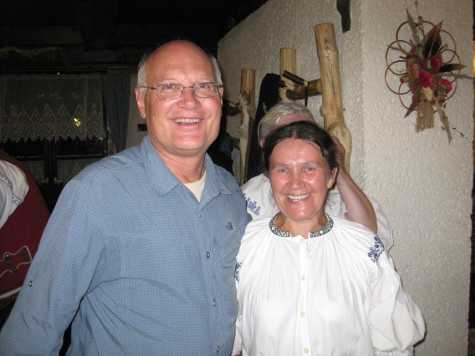
In the end, some of us got to join in with the dancers. Here is my partner, and believe me, that lady was a combination of perpetual motion machine and high speed whirling dervish. It had once again been a most interesting day, with things never experienced lining the way.
June 25 Thursday
Crossing into Poland, visiting Auschwitz once again
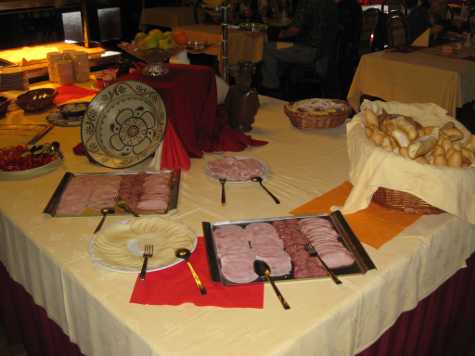
We may have been on a mountaintop, but that didn't mean any short changing when it came time for breakfast.
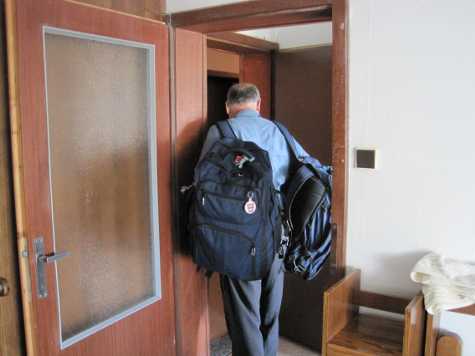
Since we were on the top floor of the top of the hotel, I volunteered to carry both our bags down the stairs. Once I managed to get out through the door to our room, it got a lot easier.
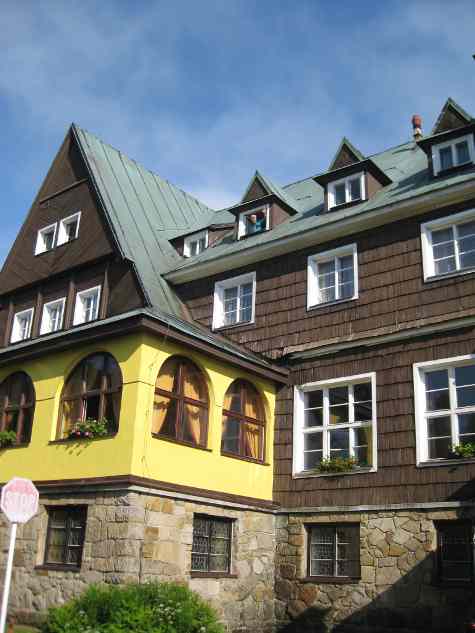
There was also another reason for my carrying the bags. It was to get a photo of Linda leaning out our rooftop window.
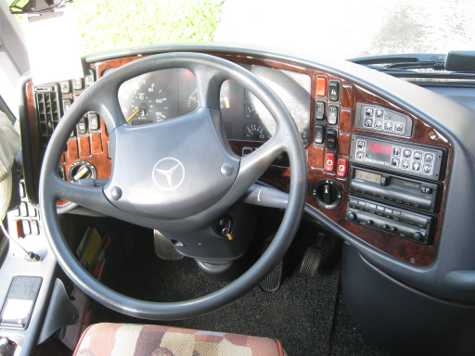
The cockpit of our bus, which is a Mercedes..

A new country means new money, as this line at the atm shows.
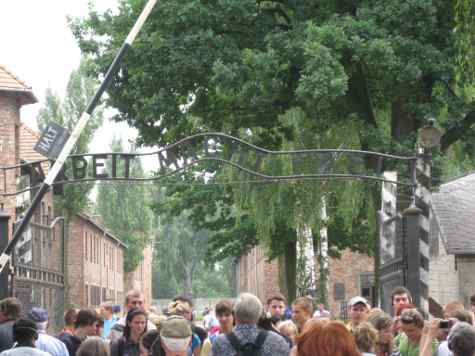
After a delicious lunch, and another bus ride, we arrived at Auschwitz. You can just make out the Arbeit Macht Frei sign above the entrance into the Lager.
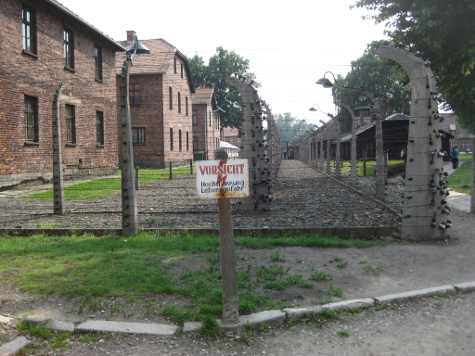
This visit, since it was with the tour, we had a guide. Unfortunately she had such a strong accent and spoke in such a dull monotone that it was sometimes impossible to understand what she was saying. It was if she had given this tour a thousand times before and just wanted to get it over. I tried to relate her voice and delivery to what took place here, yet listening to other guides as we walked along, they were not acting like robots. She didn't take away from our visit, but then she didn't really add anything to it. Perhaps just as we read about how the prisoners reacted to this place, so did she, doing just as they did, wanting to mere get through the day with no thought of tomorrow, for to them tomorrow didn't exist, only today.
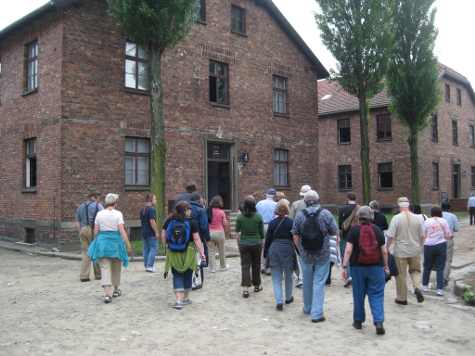
Even though we were seeing the same things we saw two weeks ago during our first visit to Auschwitz, they weren't the same. Different things stuck out, the hurt we felt, the knowledge of what the people who had been here those decades had suffered through. It can't really be put into words, and even our feelings must fall far short. Maybe it is enough to say one feels a great hurt that can't be described.
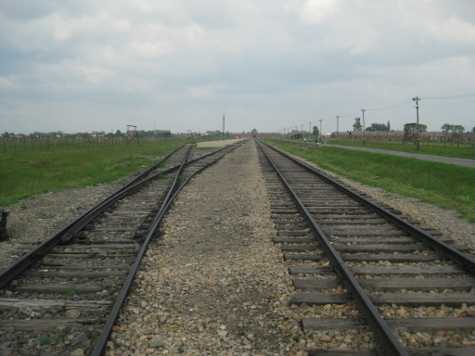
We also again visited the Birkenau extermination camp with its infamous rail siding where the "selection" took place.
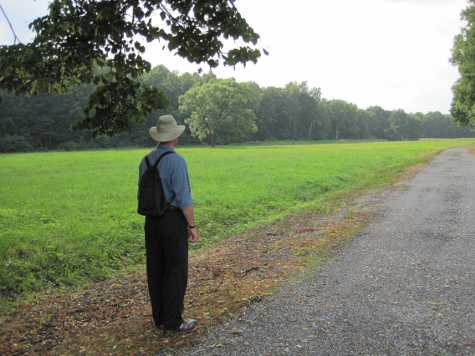
Today we wanted to visit several of the places we had missed on our last visit, including the field of ashes where the ashes of hundreds of thousands of men, women and children were dumped after they had been murdered and their bodies burned.
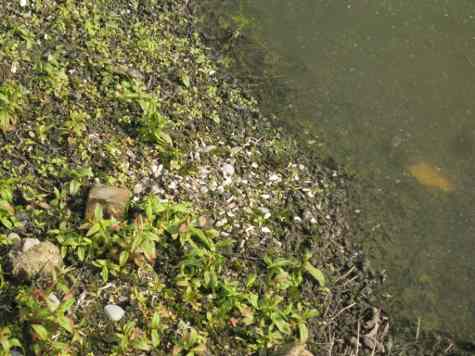
The horror of where we were was evident everywhere around, as the fragments remaining near the edge of the small pits near crematoria 4 and 5 showed.
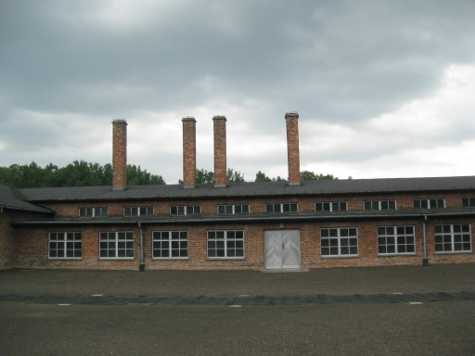
Back in the same corner of the Lager is the building where the new arrivals that were not immediately sent to the gas chambers were processed. This was the building where the showers were just that. It also contained the steam sterilizing units for the arrivals clothing. For the sake of efficiency it wasn't washed, simply disinfected by steam to prevent the spread of diseases.
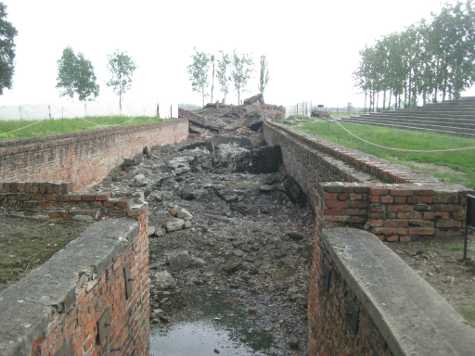
The ruins of the gas chamber and crematoria number 3. Even if you were lucky enough to not be murdered immediately upon arrival, this was still your eventual fate once you were no longer of any use to the Nazis, if you hadn't already died from starvation or disease.
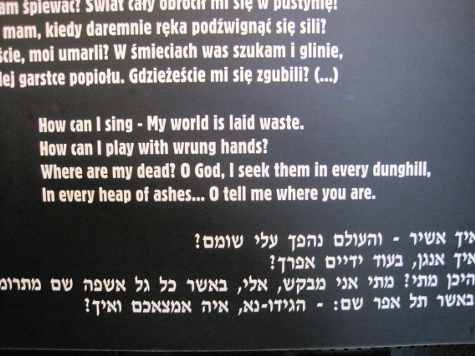
June 26 Friday
The churches of Krakow and John Paul II, a unique meal experience, a cemetery
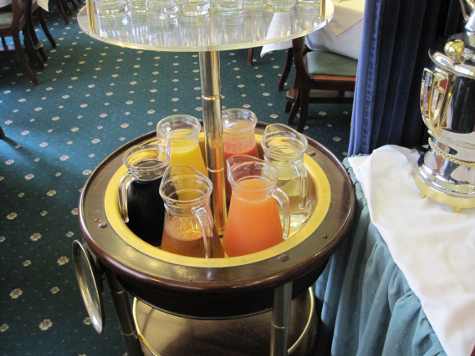
What follows is a photo presentation of what else was available for breakfast once we got past the juice.
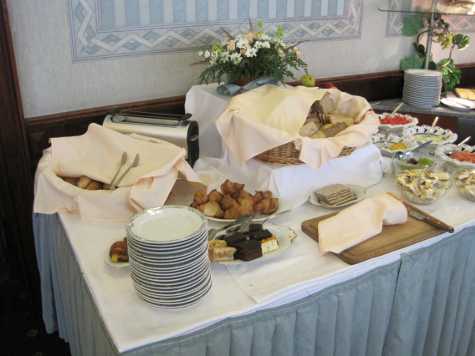
Breads, rolls, pastries, cakes and spreads..
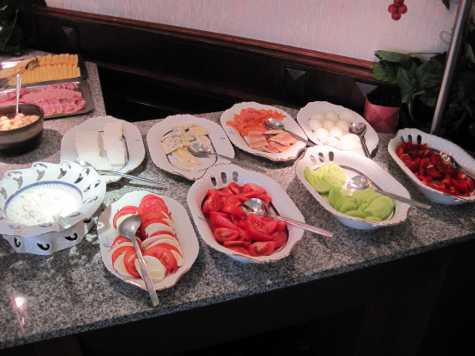
Eggs, vegetables, fish and soft cheese
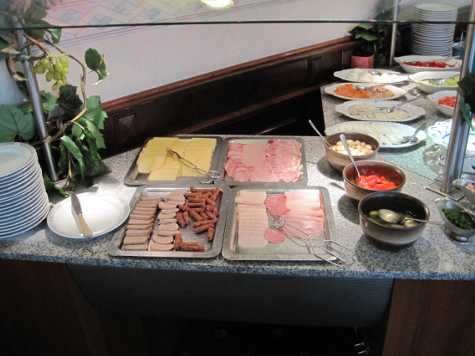
Meats, cheeses and pickled vegetables.
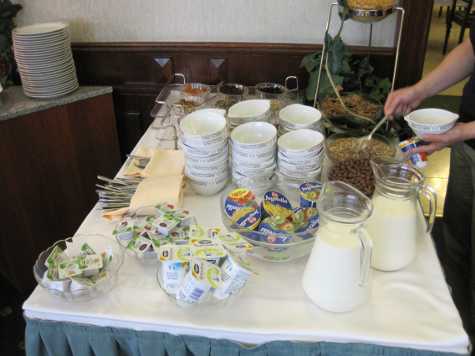
Cereals, milks, yogurt, jams, jellies and spreads.
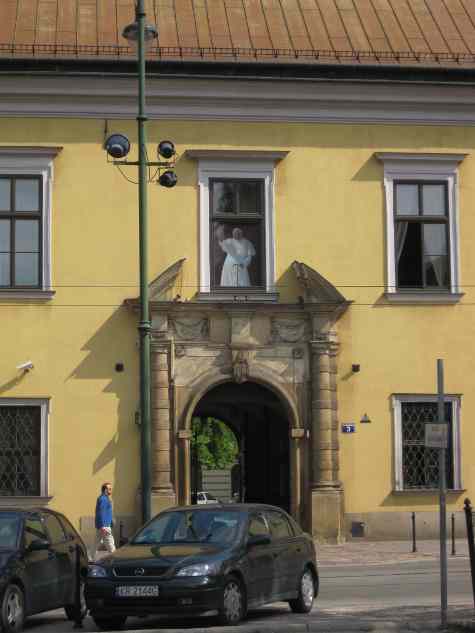
The day was pretty much taken up with tours of Krakow and it centered around Karol Wojtyla, the man who would become Pope John Paul II. Every church boasts of the place where he sat, or featured a memorial to something he said while there. Even the building where stayed when visiting Krakow the first time after being elected Pope showed where he had talked to the people from a window. It was also in this square that they first heard the news of his death, and the mourning for the greatest of all Poles began.
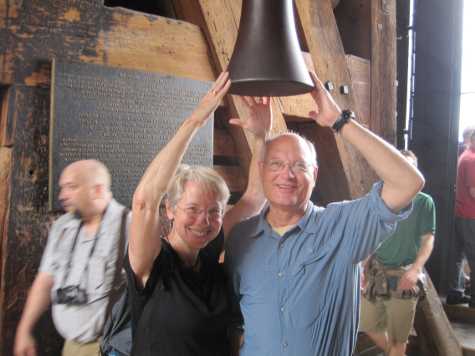
Standing under the clapper of the second largest bell in Poland.
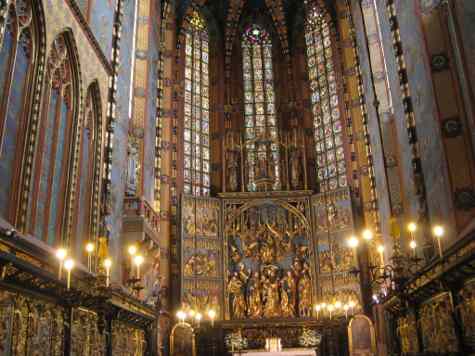
Alter piece of St Mary's church. Its quite a spectacle when it opens, and we were there to see it.
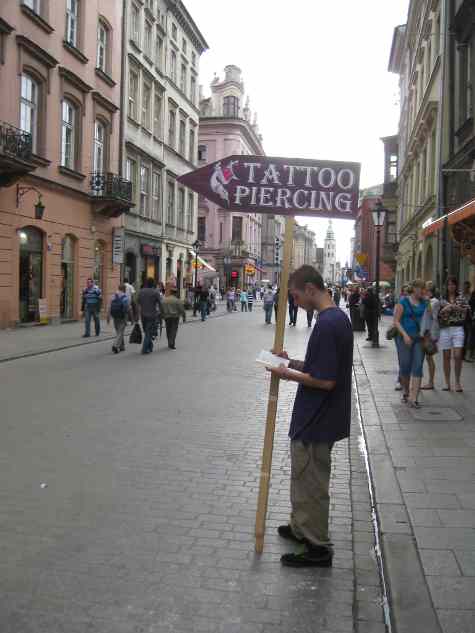
After seeing the people who madly wave signs in the States trying to get you to visit a new housing development, or buy a mattress, for example, this fellow's approach was a refreshing change. From what we saw, his approach attracted far more attention than had he been gyrating.
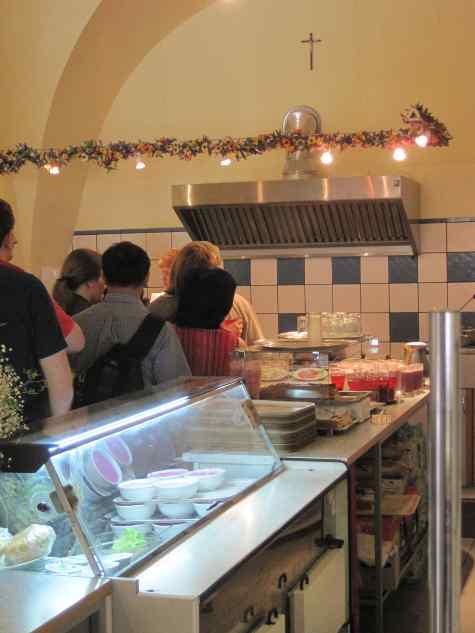
Lunch was a real experiences since we ate at a milk bar. This is a hold over from the communist era, and the one we ate at was described a communist ears time capsule. It was truly a Polish only place.No menu, and the only thing spoken was Polish. It is also not what the name implies. Think the simplest caferteria you can imagine, make it far simpler, with a very limited number of items to eat and you have an idea of what it was.
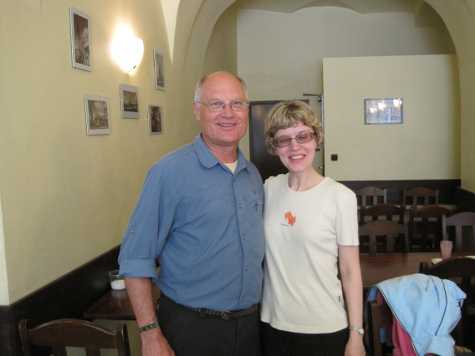
Had it not been for this wonderful young woman who was in line in front of me, we would have been lost. Eight Americans who spoke no Polish all had a wonderful meal thanks to her help. She was truly a special person. And while the food was unbelievably inexpensive, it was also very good, but even so, it had no comparison to the experience of ordering it, which was one of those "pinch me, is it real" moments.
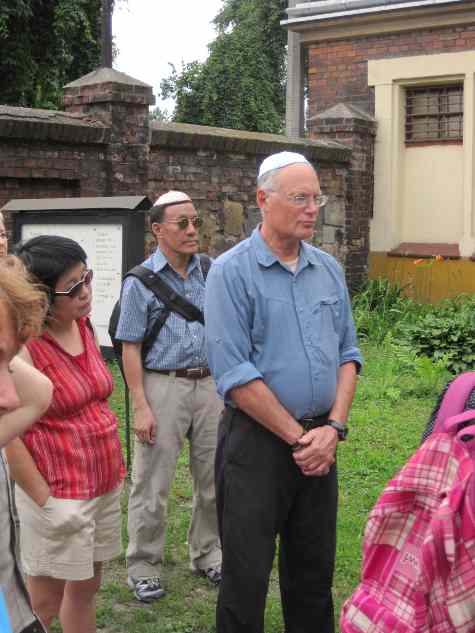
We also visited the New Jewish Cemetery, new in the sense that it was new compared to the Old Jewish Cemetery. It was also a place where all the men covered their heads.
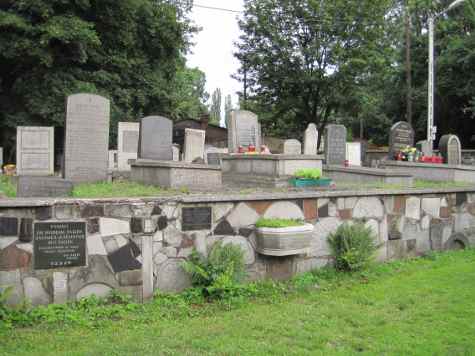
The Old Cemetery had been destroyed by the Nazis during WW II and the smashed and broken stones used for fill. As they are uncovered, or discovered, they are returned to this cemetery and incorporated into its walls. It is a poignant reminder that the consequences of hatred know no boundaries, even extending to the dead.
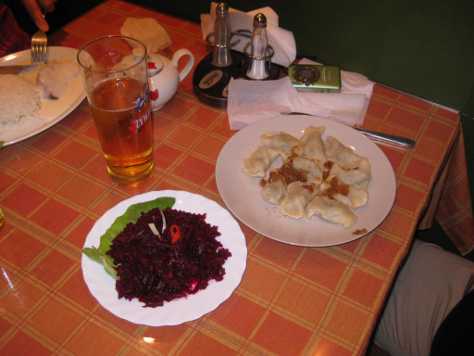
We began with food, we'll end with food. This is a good country for anyone who loves beets, meaning we both really enjoy the food.
June 27 Saturday
New town, and around town, off to the salt mine, a rainy day in Poland.
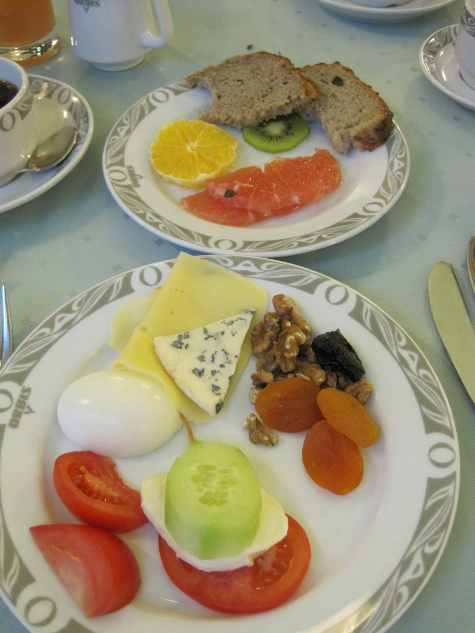
Given all that fabulous food we have to choose from at the hotel breakfast buffet, here is what Linda chose this morning.
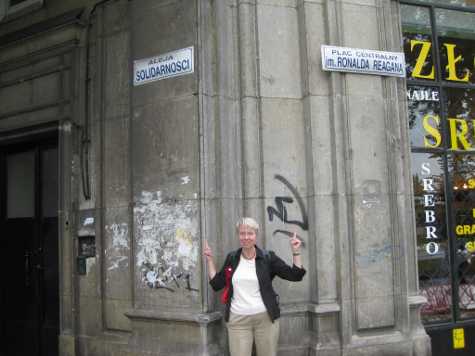
With a free morning, we decided to take the half hour tram ride over to the Krakow suburb of Nowa Huta, which means New Steel Works. There is nothing new about, it having been built in the 1950's. What it was, was a totally planned town where farm fields were turned into a workers paradise, communist style. As you can tell, once the communists were tossed out, the names of the main streets and the central square were changed
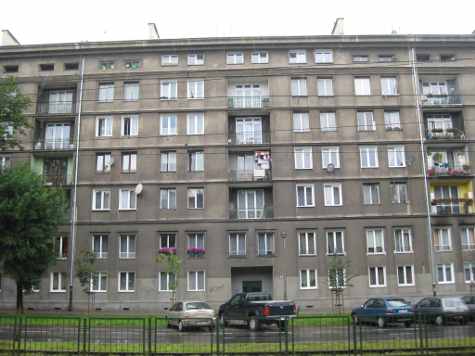
The buildings lining the main roads were all massive apartment buildings which still sported their communist gray color. Designed so that the main form of transportation were the trams, the roads themselves were secondary to the tram tracks.
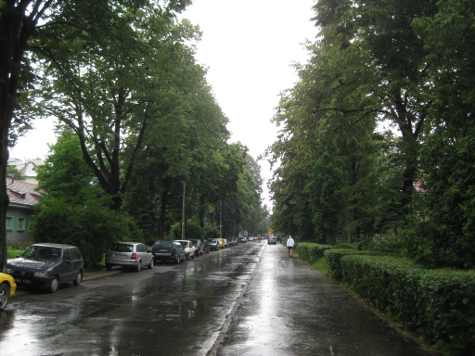
Away from the main roads, the streets were tree lined and gave the appearance of a street in the States. It was just that there was not a single family dwelling to be seen. Every dwelling was an apartment building. Even so, the multitude of open space, the child care centers in the center of the courtyard area, and the schools gave the appearance of a pleasant place to live. The only problem was there didn't appear to be many places to buy anything.
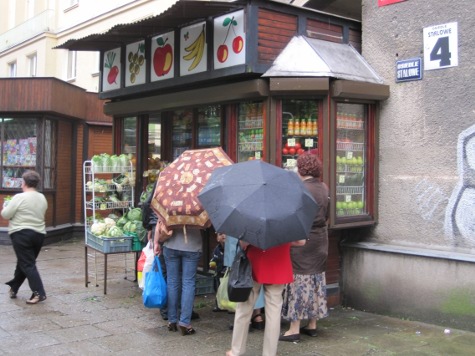
Maybe harking back to the days of communism, there was a line of elderly women waiting patiently to purchase fruits and vegetables from this tiny stand.
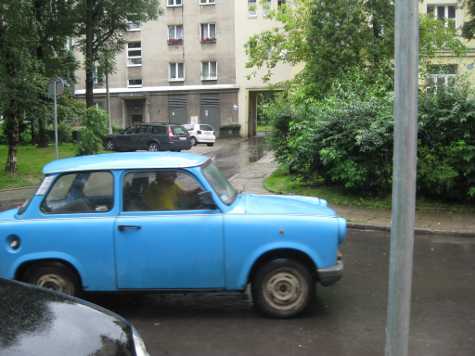
Another glimpse into the past.
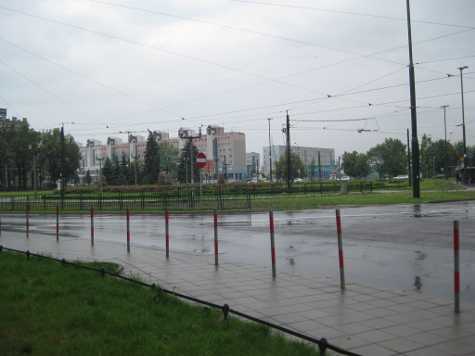
Gloomy rain, gloomy buildings.Maybe it was a fitting morning to have visited the workers paradise, because once we took the tram back to Krakow, we discovered the rain had become an intermittent drizzle.
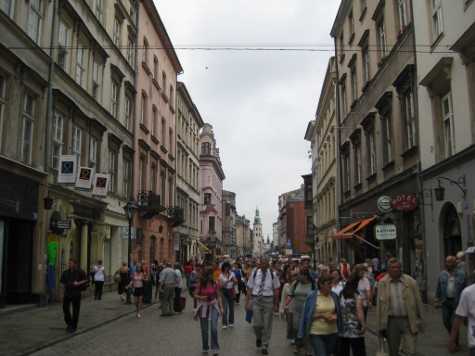
With it being the weekend, the streets were alive with people.
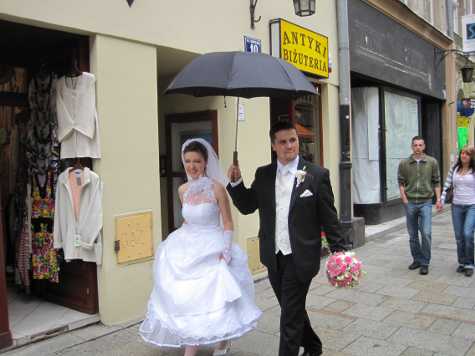
It was a case of never knowing exactly who you were going to see on the streets.
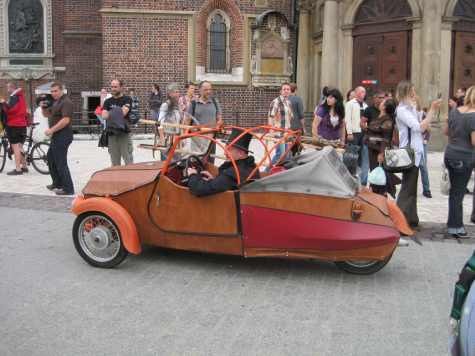
Nor did you know exactly what you were going to see.
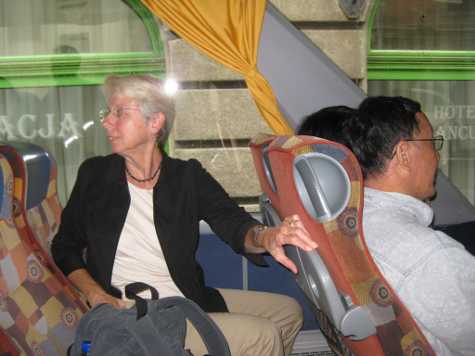
In the afternoon we took a tour of the large salt mine that just on the outskirts of Krakow. It also gave me another opportunity to document the fact that Linda is indeed and angel. What else could explain the miracle of the halo appearing over her head.
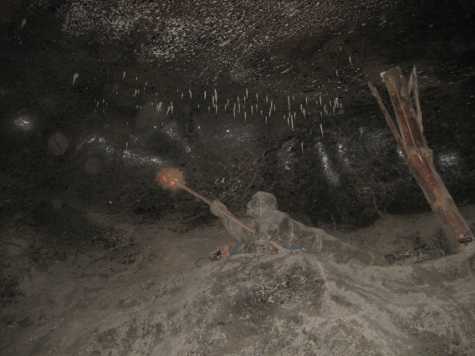
The mine was quite interesting. It is no longer a working mine, but the salt carvings made by the workers over the centuries were very intriguing. We also learned that even though we visited three of the five levels, there is only 5 percent of the mine that is open. It was also a place that reminded us of our friend Judy and her love of different kinds of salt. Especially since they had a dispaly of all the different kinds of salt that was mined. Judy, bring lots of Zolty's and be prepared for some very heavy luggage for John to carry on the trip home.
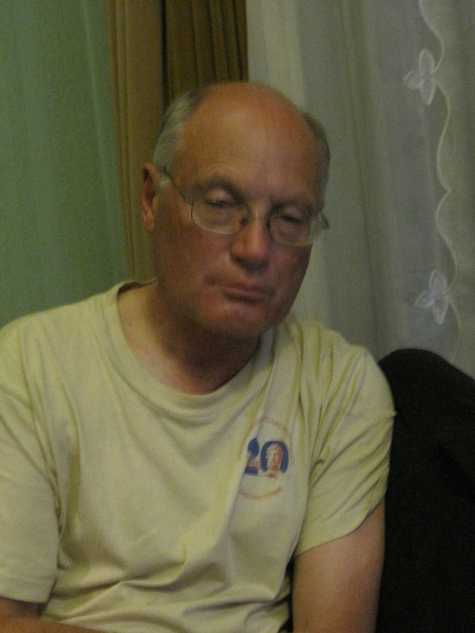
In the evening, was trying to write the Daily Journal, but having little luck. I kept telling Linda I was having trouble concentrating, she responded that maybe it was something else. Looking at the photo she took, I guess she was right.
June 28 Sunday
A very long day on the bus, picnic time, rain, a small town walk and an awesome meal
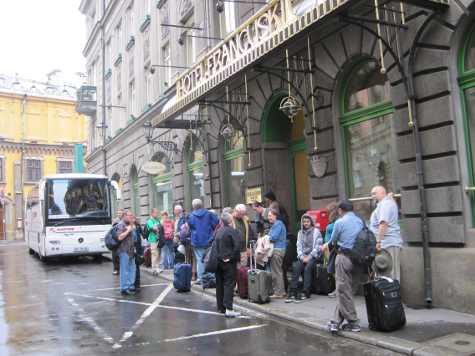
Even though this was to be our longest day on the bus of the entire tour, everyone was out and eager to begin the trip. It reminded me of what may have been the scene during the war as the various ethnic groups were rounded up to be shipped off to one of the Nazi camps. Carrying that over when I boarded the bus, I found a book, describing the authors experience as a young Italian Jew at Auschwitz, which i planned to read during the day's drive.
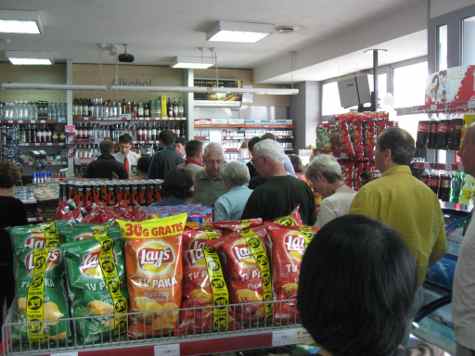
Our first stop, which was a potty break, was the last time we would be stopping in Poland. This is the line to spend the last Zloty's. We had done exceptionally well in the money management department, thanks to Linda, and had only 7 Zloty left, which she promptly spent on a dark chocolate bar as a reward for herself.
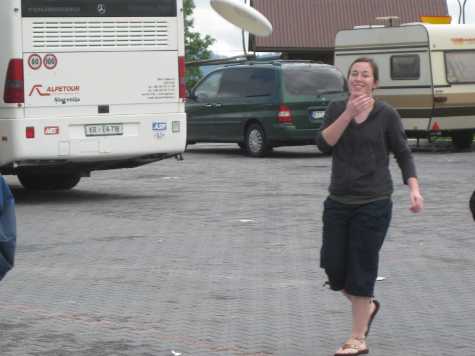
With so many people trying to spend their money, and it taking so long, some of the younger members of the tour took up a game of Frisbee. Here's Meredith showing off her form.
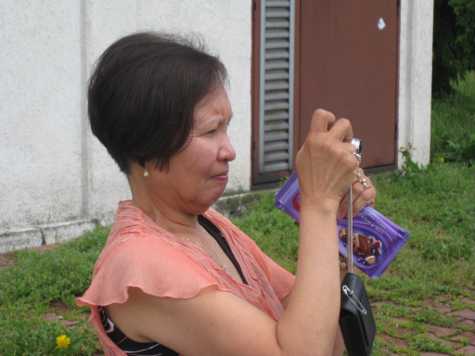
Also, I wasn't the only one taking photos of the action.
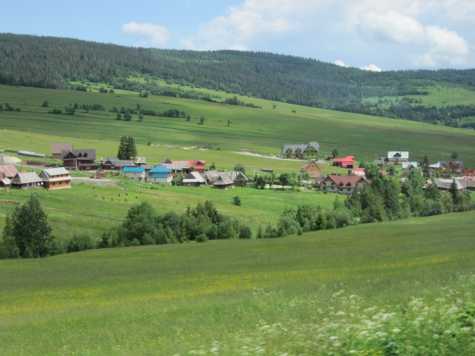
Soon we were into Slovakia, which sure looked a lot like Poland.
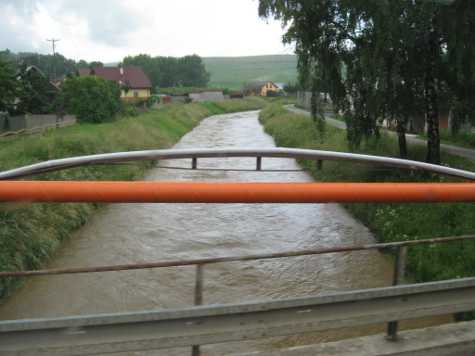
Though it hadn't started raining yet, many of the streams and creeks we crossed showed the results of the rain that had fallen over the past several days.
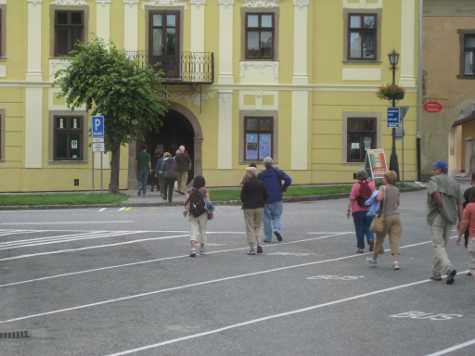
Our noon stop was in a small town where we were to have a picnic. This is not a view of everyone rushing off to the store to buy something for the picnic. Honza was supplying all the food and drinks. This is the rush to the restrooms.
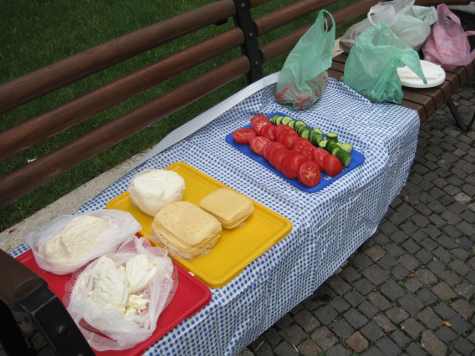
As it turned out there was more food than we could eat. I got lucky as there were several kinds of sheep's milk cheese, and many people either passed on them, or took very little. Linda, having totally reversed her opinion of sheep cheese, also enjoyed them. What's next, is she actually going to eat some raw onion one of these days. Don't think I'll hold my breath on that one,
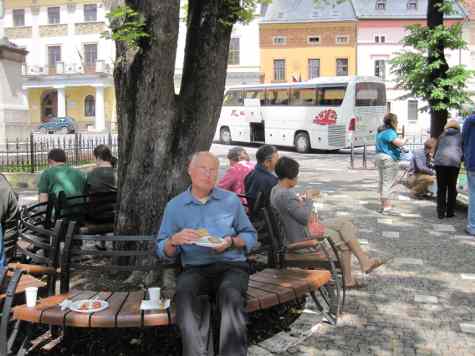
Everyone was enjoying themselves as we sat under the trees in a small park on a beautiful Sunday afternoon. Afterwards we toured the town church, which had more outstanding alter pieces than many museums have.
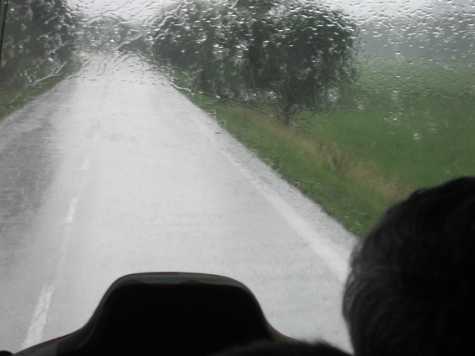
No sooner had we boarded the bus than the skies once again opened up, this time with a vengeance. Our route was taking us along roads that were not much wider than the bus, and with all the rain, our speed had to of been much slower than had the weather been nicer. Eventually we made our way into Hungary, and the small town of Eger. It had been a long bus ride, but it also afforded me the opportunity to read the book and understand just a little more of a time that must never be repeated.
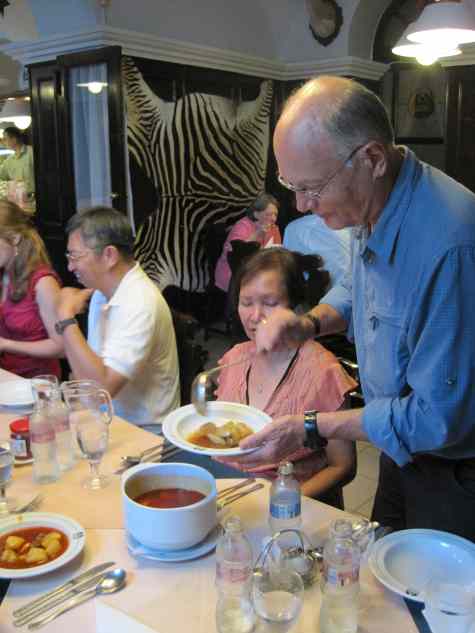
The meal was a group meal, and as has been the case throughout the tour, the food was outstanding. Beginning with a beef and vegetable soup. Next was sausage, pork and a cabbage roll. Then came goulash and noodles topped with sour cream. Next was apple slices with fresh berries, liver of goose, and creamy buttery mashed potatoes that made Linda a believer in not judging food by its name. To show what that means, she had a second piece of liver.
To top off the meal, dessert was a piece of apple strudel, and an apple crepe, or pancake as they call it, drenched in, to die for, dark chocolate. I also have to point out that the fellow who dished out our soup wasn't so bad either.
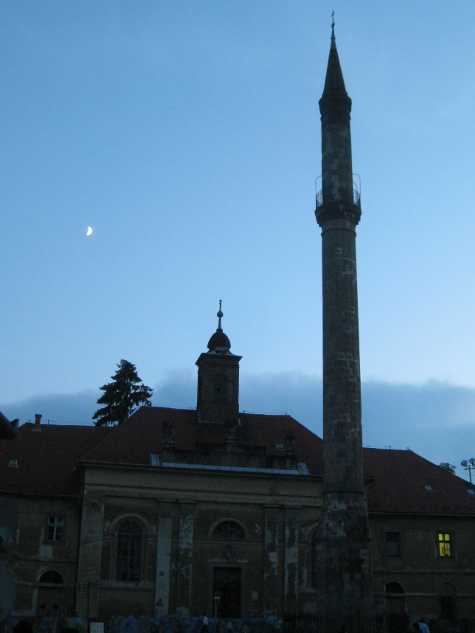
Later, possibly to burn off all those calories, Honza led a group of us on a tour of the town, climbing high above to the castle, then back down to where something unique stood. This is the northern most ancient minaret in Europe. Having been built when the city was ruled by the Ottoman Empire after being captured by the Turks. It seems like no matter where we travel, there are ties from one country to another, and from empire to aempire. It makes the world not nearly as big as we formerly thought it was.
June 29 Monday
A morning walk, time with teacher, communist labor camp, wine tasting, the big city
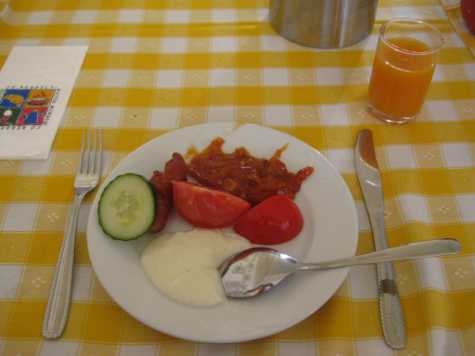
Our willpower to resist all the tempting delights of the breakfast buffet was infine form today. With our hotel being a health resort type hotel, eating healthy was easier. Besides, we have discovered that Hungarians really know how to fix peppers, something we both enjoy.
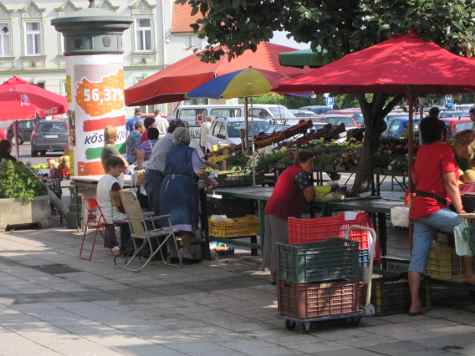
The Eger town market, and being a small town, it was a very small market.
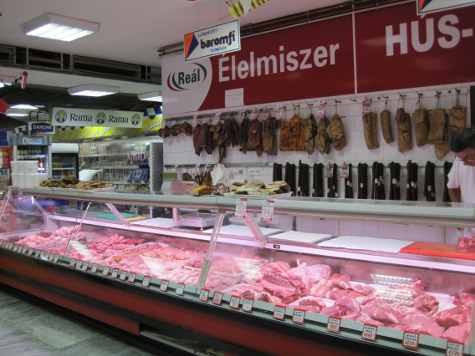
Looking through the window of the town's grocery store, we could see the difference between the meat department in an American supermarket and in a Hungarian store.
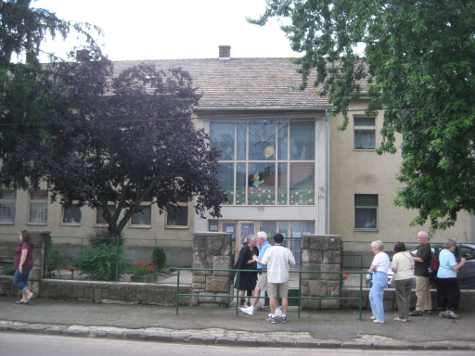
Today we were visiting an elementary school, but because school was out for the summer, only the teacher would be there. From the outside it looked like many schools in the States.
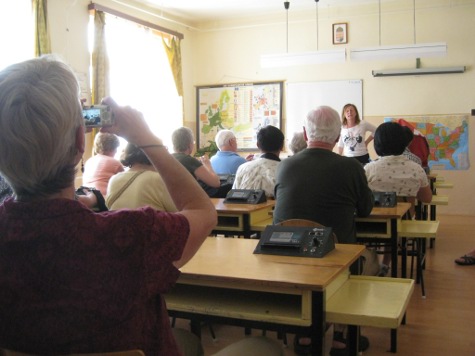
Once we were inside a classroom, which was the language lab, some people paid attention to the teacher while others took photos. The languages taught were English and German. At age ten the students had to pick language to study, with the vast majority picking English. As was true in the other countries we visited, it was British English that was taught. Understand that English is not taught because of the power of the US, it is taught because it is the common language of communication between the different countries of Europe, and a country where many of the people speak English as a second language has an advantage.
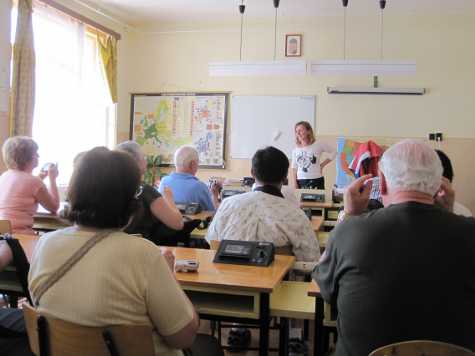
We had an interesting time with the teacher as she answered our questions. To my question regarding the difference between teaching under communism and teaching now, she had been teaching for 30 years, she said it was much harder to teach now than under communism.
Under communism every thing was the same, now the students get to pick what they want to study. Then the parents knew if the children didn't comply, the parents would be reprimanded and the state could take things away from them. Now she had to make the lessons interesting to maintain the children's attention which took more time on her part. As for me, I couldn't work up any sympathy for her.
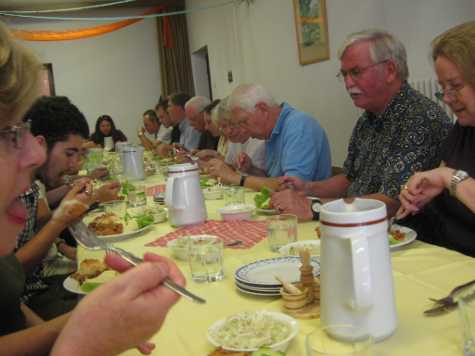
We also ate our group lunch in the school cafeteria, though they did say that what we ate was an improvement over what the students would have received.
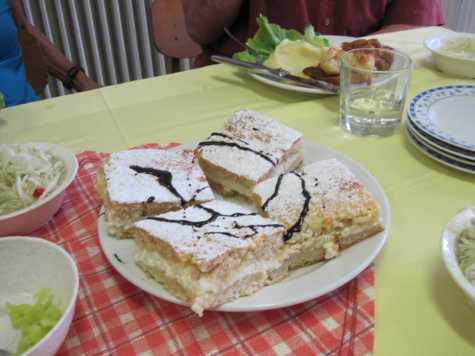
Soup, coleslaw, breaded chicken, and pork, creamy mashed potatoes, followed by this apple and cheese cake. It wasn't the school lunches that I remember either.
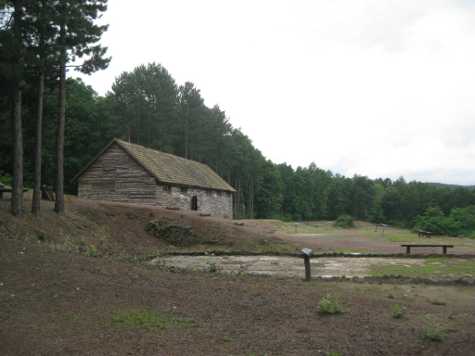
Our next stop showed that while the teacher longed for her life of ease under communism, there was another side to that era, the forced labor camps. Resck was the largest and most notorious camp in Hungary, where the political prisoners were forced to work long hours in a quarry, living in even more primitive conditions than the prisoners of Nazi concentration camps.
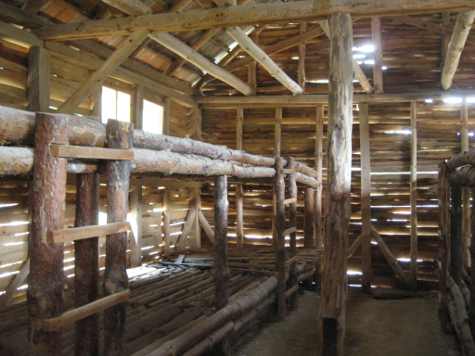
Opened under Stalin, it was a place of terror in the sense that you didn't have to do anything wrong to be sentenced here. Simply being in the wrong place when the secret police needed to make an arrest was enough. You were given a sentence, but that had nothing to do with how long you were incarcerated, which was always much longer than the sentence. It was one way to make sure that the veneer of a happy life under communism shown to the outside world was preserved.
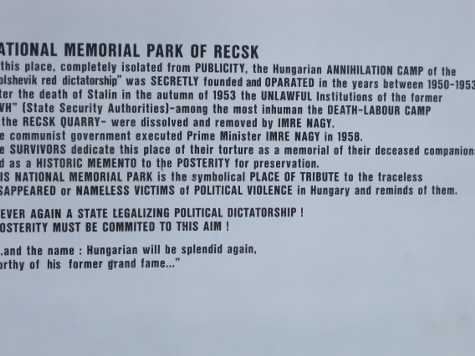
Plaque erected by the former inmates of the camp. Didn't get the left edge when I took the photo, but it is still readable.
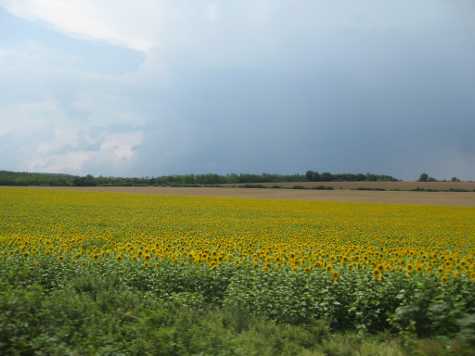
Not far away from that place of horror was a field of sunflowers. The freedoms we enjoy can never be taken for granted, and those who want to force any form of control on us, whether through religion or other means must be resisted. It's a road that has an end we don't want to arrive at.
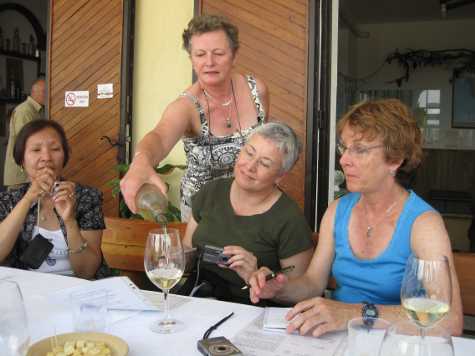
It was a day of many things, for we were next treated to a tasting of Hungarian wines. The owner of the vineyards had fled the country, learned winemaking in France, then returned to reclaim his families lands after 1989. Today he lives a life he could only dream of 30 years ago.
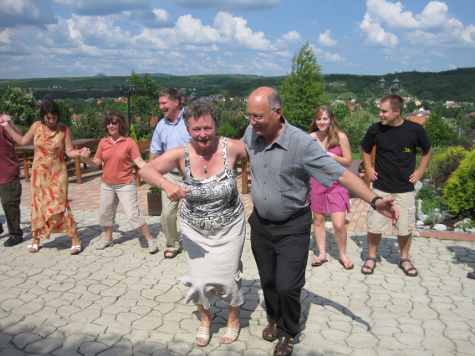
Our wine tasting was followed by dancing.
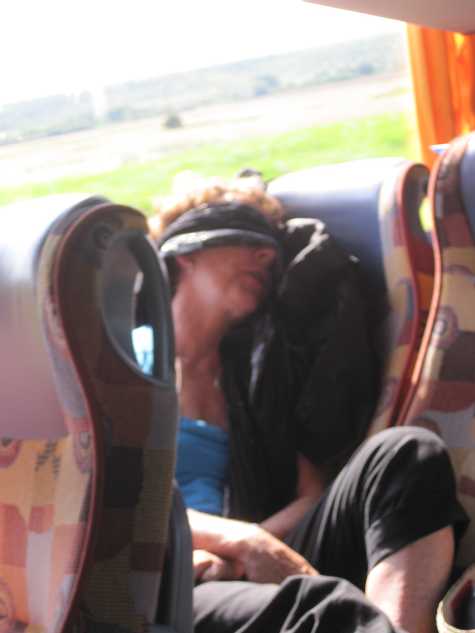
The bus ride into Budapest revealed the extent of the partying that had gone on at the winery.
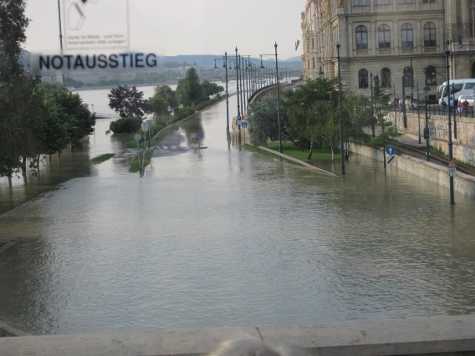
Our entrance to Budapest was accompanied by views of the Danube River, which, instead of being blue, was a muddy brown, being in flood from all the rains. Thus began our three nights in Budapest.
June 30 Tuesday
Discovering Pest and an evening cruise
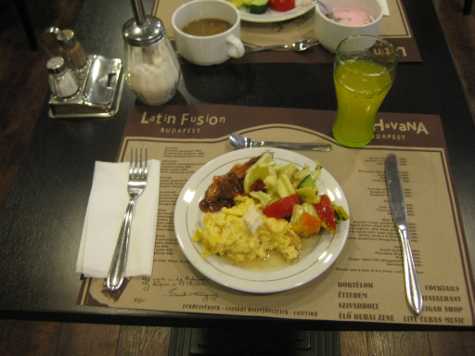
Hungary and paprika go together, but since paprika is ground dried peppers, Hungary and peppers also go together. I did my part at breakfast in making sure to consume some of the local peppers, fixed in more ways than one.
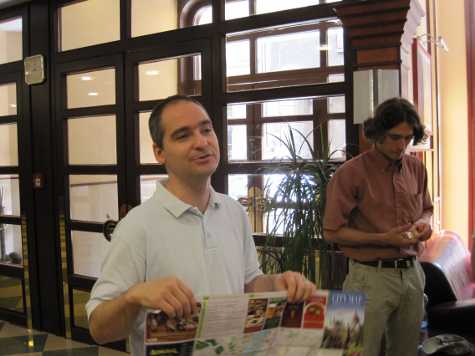
Our morning would be spent with our town guide, Peter, who turned out to be the very best town guide we have ever had. This was what he did, and it showed. In a later conversation I learned he was also a Rick Steves guide who conducted the Eastern Europe tours just as Honza. I guess you could say the force was with us to have two such talented guides.
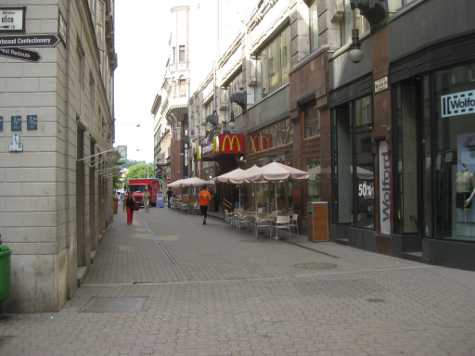
No, we didn't stop here to eat. This is the most famous McDonalds in the communist world, having been the very first one. Peter told us the line to get in was a block or more long back then, but not because the food was so good, it wasn't. The real reason was that for the few minutes you were inside you were experiencing the West. As he said, unless you lived under communism you couldn't appreciate the significance of that, but it was the most wonderful feeling.
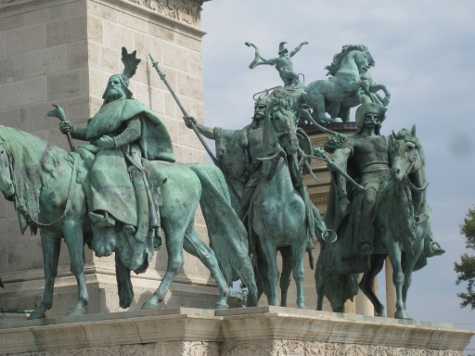
One of the numerous statues found around Pest. Pest, what about Budapest. Buda is the hilly city to the west of the Danube, Pest is the vast plain to the East. They were eventually united into modern Budapest, yet each keeps its on unique identity. As Peter joked, the wild people live in the east - Pest. The civilized people live in the west - Buda.
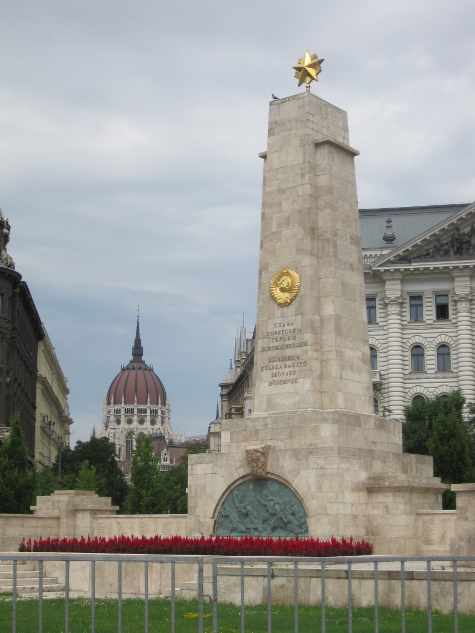
Soviet war memorial to the Soviet soldiers who lost their lives "liberating" Hungary from the Nazis and preventing it from falling into the hands of the West. It still stands because it was paid for by the families of the soldiers, not the Soviet government. Nearby is the most heavily guarded building in the city, our embassy.
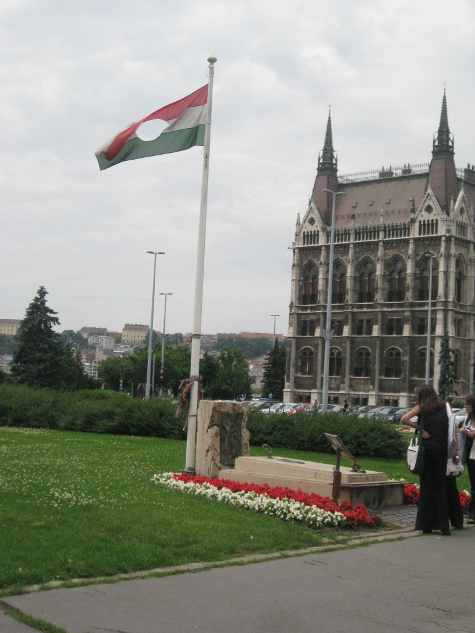
An interesting memorial. The Hungarian flag with a hole in it. This is where the secret police fired into the crowd in 1956, killing many people. The flag then had the communist symbol in the center. The hole now represents the removal of the communists from the fabric of the country. In the fighting that occured after this murder of the people by the secret police, over 25,000 Hungarians lost their lives as the Russians brutally crushed the rebellion. As we learned elsewhere in this part of Europe, they dislike the Russians even more than they do the Germans.
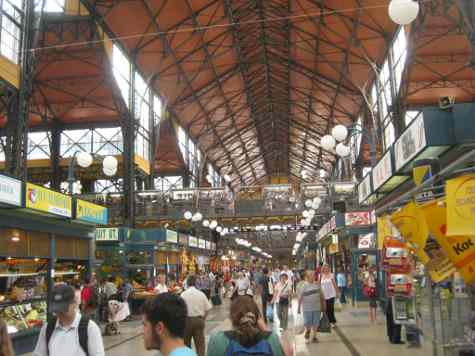
We also visited the massive indoor market. Though we didn't find anything to buy, we found a neat place to eat lunch up on the second level, then bought some cherry-poppy seed strudel for dessert at one of the booths.
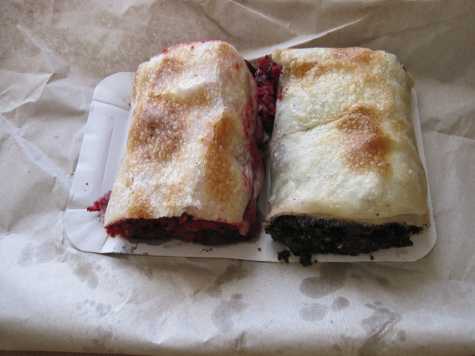
We never would have thought poppy seeds would add so much to a dessert, They are so important to the Hungarian people that a special provision was added allowing them to grow poppy seeds in their backyards when Hungary joined the European Union.
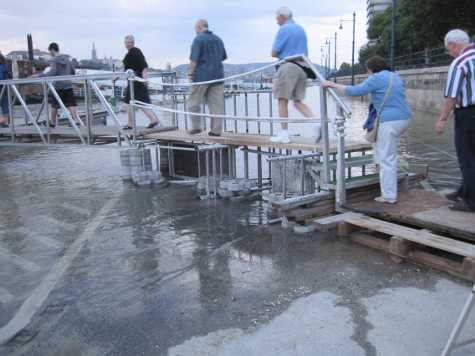
In the evening we took a cruise on the Danube.Due to flooding, there was a question whether the boats would be running or not. You can see the temporary walkway the erected over the flooded highway to even get us out to the boat.
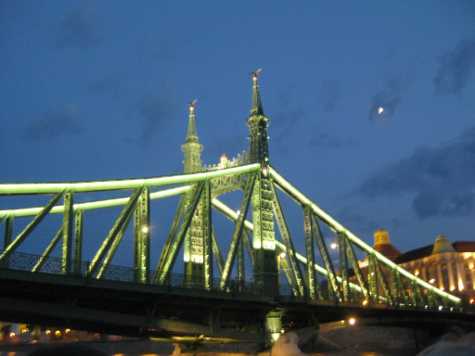
What followed was a delightful cruise, the lights of the bridges and the buildings making for more than a few magical moments.
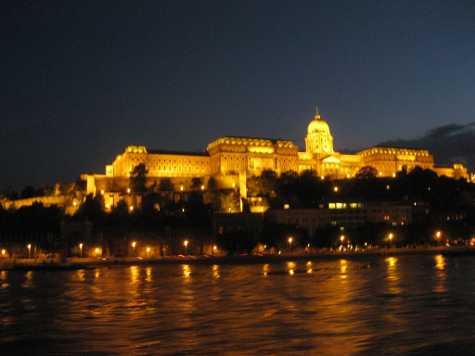
I'll end this post with a photo of the castle high on the Buda hills, a palace we will be visiting tomorrow.
